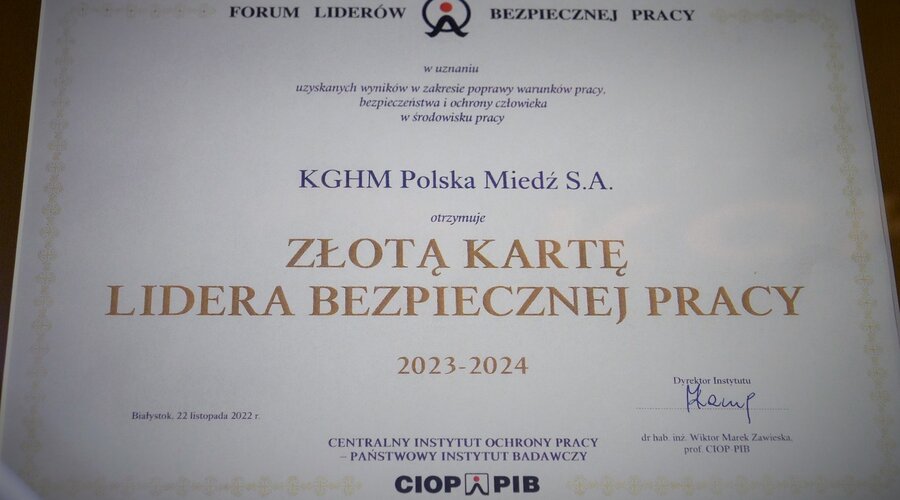Gold KGHM
KGHM with the Gold Card for 2023-2024. Once again, the Central Institute for Labor Protection - National Research Institute (CIOP) awarded our company with the Safe Work Leader Card.
KGHM received its first Safe Work Leader Card back in 2000 and its first Gold Card in 2002. Since then, the Company has continuously maintained its position as a safe work leader.
KGHM is the only representative of the underground mining and metal processing sectors in this group. The improvement of safety and working conditions at KGHM has once again been recognized. KGHM is starting the new year with another Gold Card.
“Our ambition is to achieve the long-term goal of ‘zero accidents’ due to staff-related and technical causes and zero occupational diseases. This is a big challenge for us, but we believe that this goal is achievable even in the mining sector. In few industries is security such an important issue as it is in ours. We are implementing a lot of technical measures to ensure that the rock mass tremors occurring in our mines are only those that are provoked in zones and at times without working crews. We attach great importance to this, because we cannot fully control natural hazards, but many accidents can be avoided by maintaining correct posture, behavior, and caution, as well as by using appropriate clothing and personal protective equipment,” said Marek Świder, KGHM’s Vice-President for Production.
The Vice-President thanked the entire KGHM staff for the contribution of the individual behavior of each employee to the fact that the company has earned the highest distinction awarded by the CIOP, by handing out “gold cards” to the key OHS engineers.
KGHM Polska Miedź S.A. has been a member of the Safe Work Leaders Forum since 2000, almost from its very inception as a joint initiative of the CIOP and the communities representing various sectors of Poland’s economy. The Safe Work Leaders Forum, as he emphasized, is an organization that currently brings together 170 companies from all over Poland, which can be set as an example on issues related to safe work culture.
Occupational health and safety, especially due to the nature of the operations of KGHM Polska Miedź S.A., is a priority in the adopted Human Rights Policy. Protecting the right to decent working conditions that meet health and safety requirements (Occupational Health and Safety Policy) is a concrete action and a manifestation of concern for the health of every person present on the Company’s premises.
Each Branch has a Company Social Labor Inspector with the right to intervene when risks or violations are identified. There are also department labor inspectors in branches with extensive organizational structures. Problems reported in the area of occupational health and safety are also resolved by the Occupational Health and Safety Committee, which includes representatives of the employer, the Company Social Labor Inspector, an occupational medicine physician, and trade union representatives.
The quality of observance of these rights at KGHM is evidenced by the numbers: last year, the LTIFR (which determines the number of accidents per million working hours) was 5.63. That is 23 percent less than in 2020 and 70 percent less than in 2010.
In the past 2 years, KGHM has continued to implement the Think About Consequences Employee Safety Improvement Program and has used innovative technologies in line with the updated strategy, including safety training using virtual reality.
The activities carried out as part of the Think About Consequences Program are designed to change the employees’ habits through instruction, fictionalized accident reconstructions, educational videos, posters, flyers, and campaigns on the effects of psychoactive substances.



